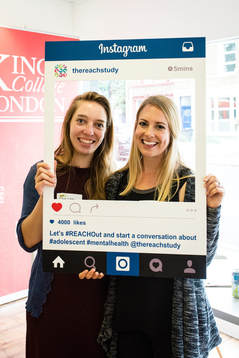Resilience, Ethnicity, and AdolesCent Mental Health (REACH)
Principal Investigator: Professor Craig Morgan
Phase 1: Funded by the European Research Council
Phase 2: Funded by United Kingdom Research and Innovation
Phase 3: Funded by the UK Economic and Social Research Council
Principal Investigator: Professor Craig Morgan
Phase 1: Funded by the European Research Council
Phase 2: Funded by United Kingdom Research and Innovation
Phase 3: Funded by the UK Economic and Social Research Council
|
What is the aim of REACH?
Most mental health problems first emerge during adolescence. Invariably, the most disadvantaged and at-risk groups in society – such as most minority ethnic groups and those who grow up in poverty and in challenging circumstances – are under-represented in national and other large-scale studies. This is important because mental health is intimately connected to social, economic and environmental contexts and experiences. The aim of REACH is to provide detailed and extensive information on the nature, distribution, and determinants of mental health among young people from diverse backgrounds and densely populated inner-city areas over time. The project explores why some young people develop mental health problems, whereas others do not. In doing so, REACH will inform the development of interventions to promote mental health and prevent mental health problems in young people from all backgrounds. |
Download a copy of the REACH Protocols by clicking the links below
How will REACH achieve this?
REACH is an accelerated cohort study that comprises 4353 adolescents who were recruited from 12 mainstream secondary schools in inner-city London, UK.
Baseline assessments (T1) were conducted when participants were aged 11-14 years, and the cohorts were followed up one year (T2) and two years (T3) later (>90% retention rate). These assessments consisted of an in-class questionnaire that included items on mental health, risk and protective factors, and underlying mechanisms. A subsample of participants also completed additional interviews and provided biological samples. Data collection was extended at three timepoints during the COVID-19 pandemic (T4, T5, and T6) to assess the impact of the pandemic and related social restrictions on adolescent mental health and wellbeing.
In 2024/25, we will be conducting the next wave of data collection (T7) to examine the transition to adulthood in the context of recent social and economic crises and widening inequalities in the UK. We aim to follow all young people who comprise the REACH cohort and who have provided consent to be re-contacted. We have already collected detailed information on their mental health and risk/protective factors at multiple timepoints during adolescence and throughout the COVID-19 pandemic. We are therefore in a unique position to examine young people’s mental health during the transition to adulthood in a large, diverse, and representative cohort.
You can see our cohort profile by clicking the button below.
Baseline assessments (T1) were conducted when participants were aged 11-14 years, and the cohorts were followed up one year (T2) and two years (T3) later (>90% retention rate). These assessments consisted of an in-class questionnaire that included items on mental health, risk and protective factors, and underlying mechanisms. A subsample of participants also completed additional interviews and provided biological samples. Data collection was extended at three timepoints during the COVID-19 pandemic (T4, T5, and T6) to assess the impact of the pandemic and related social restrictions on adolescent mental health and wellbeing.
In 2024/25, we will be conducting the next wave of data collection (T7) to examine the transition to adulthood in the context of recent social and economic crises and widening inequalities in the UK. We aim to follow all young people who comprise the REACH cohort and who have provided consent to be re-contacted. We have already collected detailed information on their mental health and risk/protective factors at multiple timepoints during adolescence and throughout the COVID-19 pandemic. We are therefore in a unique position to examine young people’s mental health during the transition to adulthood in a large, diverse, and representative cohort.
You can see our cohort profile by clicking the button below.
What is the time frame for REACH?
Several papers have been published using the REACH data - see here - and we are working hard on further analysis and dissemination activities.
GET INVOLVED!
If you are interested in volunteering/working with us, you can REACH us here!



